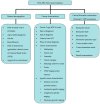The Development of a WTC Environmental Health Center Pan-Cancer Database
- PMID: 33572220
- PMCID: PMC7916067
- DOI: 10.3390/ijerph18041646
The Development of a WTC Environmental Health Center Pan-Cancer Database
Abstract
(1) Background: Recent studies have reported elevated risks of multiple cancers in the World Trade Center (WTC) affected community members (also called WTC "Survivors"). The large variety of WTC-cancers created a need to develop a comprehensive cancer database. This paper describes the development of a pan-cancer database at the WTC Environmental Health Center (EHC) Data Center. (2) Methods: A new REDCap-based pan-cancer database was created using the pathology reports and available biomarker data of confirmed cancer cases after review by a cancer epidemiologist, a pathologist, physicians and biostatisticians. (3) Results: The WTC EHC pan-cancer database contains cancer characteristics and emerging biomarker information for cancers of individuals enrolled in the WTC EHC and diagnosed after 11 September 2001 and up to 31 December 2019 obtained from WTC EHC clinical records, pathological reports and state cancer registries. As of 31 December 2019, the database included 3440 cancer cases with cancer characteristics and biomarker information. (4) Conclusions: This evolving database represents an important resource for the scientific community facilitating future research about the etiology, heterogeneity, characteristics and outcomes of cancers and comorbid mental health conditions, cancer economics and gene-environment interaction in the unique population of WTC survivors.
Keywords: September 11th; WTC Environmental Health Center; WTC survivors; biomarkers; cancer incidence; clinical cancer database.
Conflict of interest statement
The authors declare no conflict of interest.
Figures
Similar articles
-
Breast Cancer Characteristics in the Population of Survivors Participating in the World Trade Center Environmental Health Center Program 2002-2019.Int J Environ Res Public Health. 2021 Jul 15;18(14):7555. doi: 10.3390/ijerph18147555. Int J Environ Res Public Health. 2021. PMID: 34300003 Free PMC article.
-
Characteristics of Cancer Patients in the World Trade Center Environmental Health Center.Int J Environ Res Public Health. 2020 Oct 1;17(19):7190. doi: 10.3390/ijerph17197190. Int J Environ Res Public Health. 2020. PMID: 33019547 Free PMC article.
-
World Trade Center Health Program - United States, 2012-2020.MMWR Surveill Summ. 2021 Sep 10;70(4):1-21. doi: 10.15585/mmwr.ss7004a1. MMWR Surveill Summ. 2021. PMID: 34499632 Free PMC article.
-
World Trade Center Health Program: First Decade of Research.Int J Environ Res Public Health. 2020 Oct 6;17(19):7290. doi: 10.3390/ijerph17197290. Int J Environ Res Public Health. 2020. PMID: 33036199 Free PMC article. Review.
-
FDNY and 9/11: Clinical services and health outcomes in World Trade Center-exposed firefighters and EMS workers from 2001 to 2016.Am J Ind Med. 2016 Sep;59(9):695-708. doi: 10.1002/ajim.22631. Epub 2016 Jul 18. Am J Ind Med. 2016. PMID: 27427498 Review.
Cited by
-
Genome-wide DNA methylation profiles and breast cancer among World Trade Center survivors.Environ Epidemiol. 2024 Jun 4;8(3):e313. doi: 10.1097/EE9.0000000000000313. eCollection 2024 Jun. Environ Epidemiol. 2024. PMID: 38841706 Free PMC article.
-
Breast Cancer Characteristics in the Population of Survivors Participating in the World Trade Center Environmental Health Center Program 2002-2019.Int J Environ Res Public Health. 2021 Jul 15;18(14):7555. doi: 10.3390/ijerph18147555. Int J Environ Res Public Health. 2021. PMID: 34300003 Free PMC article.
-
Lung Cancer Characteristics in the World Trade Center Environmental Health Center.Int J Environ Res Public Health. 2021 Mar 7;18(5):2689. doi: 10.3390/ijerph18052689. Int J Environ Res Public Health. 2021. PMID: 33800009 Free PMC article.
-
World Trade Center Exposure, DNA Methylation Changes, and Cancer: A Review of Current Evidence.Epigenomes. 2023 Dec 8;7(4):31. doi: 10.3390/epigenomes7040031. Epigenomes. 2023. PMID: 38131903 Free PMC article. Review.
-
Characteristics of survivors enrolled in the World Trade Center Health Program.Arch Environ Occup Health. 2024;79(5-6):185-198. doi: 10.1080/19338244.2024.2410495. Epub 2024 Oct 31. Arch Environ Occup Health. 2024. PMID: 39482829 Free PMC article.
References
-
- Landrigan P.J., Lioy P.J., Thurston G., Berkowitz G., Chen L.C., Chillrud S.N., Gavett S.H., Georgopoulos P.G., Geyh A.S., Levin S., et al. Health and environmental consequences of the world trade center disaster. Environ. Health Perspect. 2004;112:731–739. doi: 10.1289/ehp.6702. - DOI - PMC - PubMed
-
- Trasande L., Fiorino E.K., Attina T., Berger K., Goldring R., Chemtob C., Reibman J. Associations of World Trade Center exposures with pulmonary and cardiometabolic outcomes among children seeking care for health concerns. Sci. Total Environ. 2013;444:320–326. doi: 10.1016/j.scitotenv.2012.11.097. - DOI - PMC - PubMed
Publication types
MeSH terms
Grants and funding
LinkOut - more resources
Full Text Sources
Other Literature Sources
Medical
Research Materials




